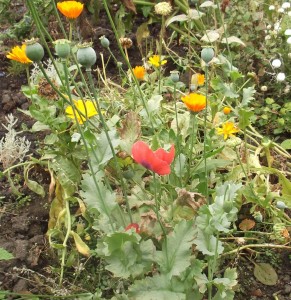 One poppy! But opium poppies seem to bloom like this – no matter how many plants you have, you mostly get one bloom at a time, for months.
One poppy! But opium poppies seem to bloom like this – no matter how many plants you have, you mostly get one bloom at a time, for months.
There are, of course, many varieties of poppy – the red field poppy, which has long narrow seedpods, whose seeds don’t seem up to much, (though I have found references to them being ground to make a substitute for olive oil), the big blousy oriental poppies, who don’t set useful seed at all, but which spread via their thick roots so they can be as persistent as ground elder, and the Wesh poppy which isn’t even the same botanical family, being a meconopsis not a papaver. No herbal uses are recorded for this plant, which also comes in a gentle orange, and seeds itself everywhere, but bees like it, and I do too. No, the one you want for edible seeds is papaver somniferum.
which isn’t even the same botanical family, being a meconopsis not a papaver. No herbal uses are recorded for this plant, which also comes in a gentle orange, and seeds itself everywhere, but bees like it, and I do too. No, the one you want for edible seeds is papaver somniferum.
Poppy has a very dubious reputation in folklore. Children were discouraged from picking them by the warning that it could bring on headaches, thunderstorms or blindness. Because it is called the opium poppy, and has been used for making all kinds of narcotics from laudanum and morphine to heroin, people have sometimes tried to change the name of this plant – the breadseed poppy, mawseed, white poppy, and so on. And it’s important to point out that every part of this plant except the RIPE seeds is poisonous. But you can’t make drugs out of poppy seeds in a domestic kitchen, thank goodness, while you can dry the RIPE seeds and use them in baking.
And of course you can pick those pretty seedheads and put them in vases without water, when they will keep that sophisticated blue-green colour indefinitely. I’m thinking of spraying some with gold paint to use as Christmas decorations too.